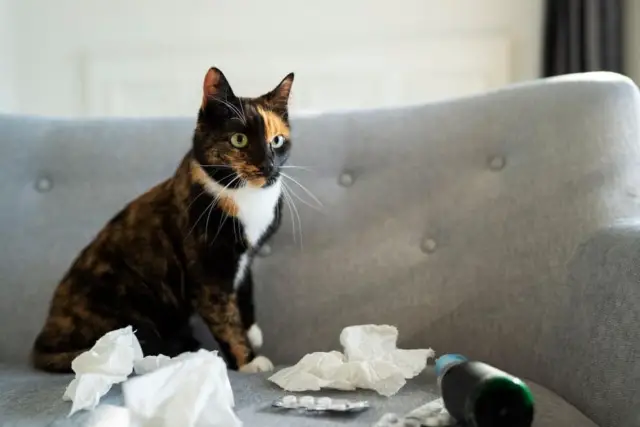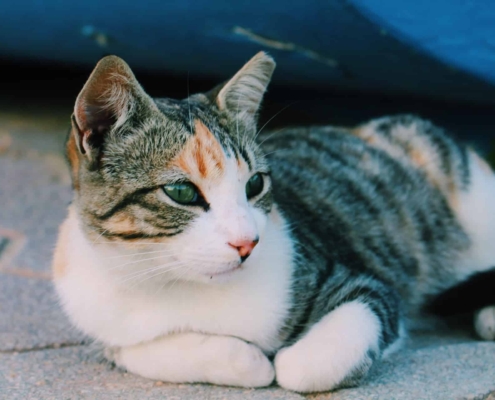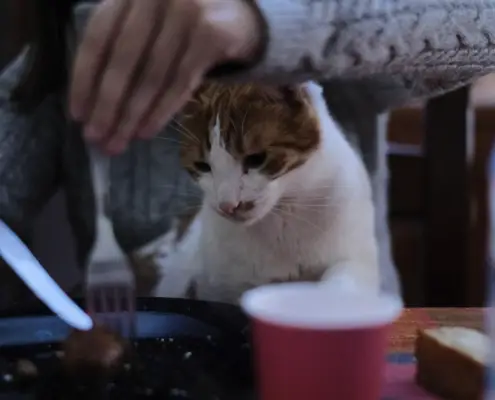
Cats are curious creatures, and their inquisitive nature often leads them to explore every nook and cranny of their surroundings. However, some common household items can pose a significant danger to our feline friends. It is crucial for cat owners to be aware of these potential hazards to ensure the safety and well-being of their beloved pets.
One of the most common household items that are poisonous to cats is antifreeze. Antifreeze contains ethylene glycol, which is highly toxic to cats when ingested. Even a small amount of antifreeze can cause severe kidney damage and, if left untreated, can be fatal. It is essential to keep antifreeze securely stored and clean up any spills immediately.
Another household item that can be dangerous to cats is cleaning products. Many cleaning products contain chemicals such as bleach, ammonia, or phenols, which can be toxic if ingested or if they come into contact with a cat’s skin. It is advisable to store all cleaning products in a locked cabinet, away from your cat’s reach. When using these products, ensure proper ventilation and keep your cat out of the room until the area is completely dry.
Symptoms of poisoning in cats
Recognizing the symptoms of poisoning in cats is crucial for prompt intervention and treatment. Cats may exhibit a range of symptoms depending on the type of poison they have ingested. Some common signs of poisoning in cats include:
- Vomiting and diarrhea: If your cat suddenly starts vomiting or experiencing diarrhea, it could be a sign of poisoning. Keep an eye on the frequency and consistency of their vomit or stool.
- Weakness and lethargy: Cats affected by poisoning may appear weak, lethargic, and have decreased appetite. If your cat is unusually tired or lacks energy, it is essential to monitor them closely.
- Drooling and excessive salivation: Poisoning can cause cats to drool excessively or have increased salivation. This symptom often indicates that the substance has irritated their mouth or throat.
If you notice any of these symptoms or suspect that your cat may have ingested a poisonous substance, it is crucial to contact your veterinarian immediately.
Immediate actions to take if your cat ingests a poison
Time is of the essence when it comes to treating poisoning in cats. If you suspect that your cat has ingested a poison, here are some immediate actions you should take:
- Contact your veterinarian: Call your veterinarian or the nearest emergency veterinary clinic to seek immediate advice. They will guide you on the necessary steps to take based on the type of poison your cat has ingested.
- Collect evidence: If possible, gather any evidence of what your cat ingested, such as the packaging or a sample of the substance. This information will be valuable for the veterinarian to determine the appropriate treatment.
- Do not induce vomiting: While it may seem intuitive to induce vomiting in your cat, it is not recommended unless specifically instructed by a veterinarian. Some substances can cause further damage when brought back up.
Remember, swift action is crucial in these situations, and it is always better to err on the side of caution. Your veterinarian will provide you with the necessary guidance to ensure the best possible outcome for your cat.
Toxic plants for cats
Many plants that are commonly found in and around our homes can be toxic to cats. It is important to be aware of these plants and ensure they are kept out of your cat’s reach. Some toxic plants for cats include:
- Lilies: Certain species of lilies, such as Easter lilies and Tiger lilies, are highly toxic to cats. Ingesting even a small amount of these plants can cause kidney failure and be fatal.
- Aloe vera: While aloe vera can have medicinal properties for humans, it can be toxic to cats. Ingesting aloe vera can cause vomiting, diarrhea, and tremors.
- Pothos: Pothos, also known as Devil’s Ivy, is a common houseplant that can be toxic to cats. Ingesting pothos can cause oral irritation, difficulty swallowing, and vomiting.
To ensure the safety of your cat, it is advisable to research the toxicity of any plants you have in your home or garden. If you suspect your cat has ingested a toxic plant, contact your veterinarian immediately.
Foods that are toxic to cats
While cats may be notorious for their finicky eating habits, it is crucial to be aware of certain foods that can be toxic to them. Some foods that are toxic to cats include:
- Onions and garlic: Onions and garlic contain compounds that can cause damage to a cat’s red blood cells, leading to anemia.
- Chocolate: Chocolate contains theobromine, which is toxic to cats. Ingesting chocolate can cause symptoms such as increased heart rate, tremors, and seizures.
- Grapes and raisins: Grapes and raisins can cause kidney failure in cats. Even a small amount can be dangerous.
It is important to note that this is not an exhaustive list, and there are other foods that can be toxic to cats. If you are unsure about the safety of a particular food, it is best to consult with your veterinarian.
Cleaning products and chemicals to keep away from cats
Cleaning products and chemicals are an integral part of maintaining a clean and hygienic home, but many of these substances can be harmful to cats. It is essential to take precautions and keep these items securely stored to prevent accidental poisoning. Here are some common cleaning products and chemicals that should be kept away from cats:
- Bleach: Bleach contains corrosive substances that can cause irritation to a cat’s skin, eyes, and respiratory system. Ensure that any surfaces cleaned with bleach are thoroughly rinsed and dry before allowing your cat access.
- Ammonia: Ammonia-based cleaning products can be toxic to cats if ingested or inhaled. Ensure proper ventilation when using these products and keep your cat away from the area until it is completely dry.
- Laundry detergents: Laundry detergents, especially those in pod or capsule form, can be dangerous if a cat chews on them. Keep all laundry products in a sealed container or locked cabinet.
By being mindful of the cleaning products and chemicals you use in your home, you can help create a safe environment for your cat.
Medications that are harmful to cats
Just like humans, cats can be susceptible to the harmful effects of certain medications. It is important to keep all medications securely stored and out of your cat’s reach. Some medications that can be harmful to cats include:
- Nonsteroidal anti-inflammatory drugs (NSAIDs): Medications such as ibuprofen and aspirin can be toxic to cats and cause gastrointestinal ulcers, kidney damage, or even organ failure.
- Acetaminophen: Acetaminophen, commonly found in pain relievers like Tylenol, can be fatal to cats. Ingesting even a small amount can cause severe damage to their red blood cells.
- Antidepressants: Antidepressant medications, such as selective serotonin reuptake inhibitors (SSRIs), can be toxic to cats. Ingesting these medications can cause symptoms like agitation, tremors, and seizures.
It is essential to consult with your veterinarian before giving your cat any medication, as some human medications can be dangerous or even fatal to them.
Preventing accidental poisoning in cats
Prevention is the key to keeping your cat safe from accidental poisoning. Here are some measures you can take to minimize the risk:
- Secure hazardous substances: Store all potentially toxic substances, such as cleaning products, medications, and chemicals, in locked cabinets or high shelves that are inaccessible to your cat.
- Research plants: Before bringing any new plants into your home or garden, research their toxicity to cats. If you have toxic plants, ensure they are kept out of your cat’s reach.
- Be cautious with food: Avoid feeding your cat foods that are known to be toxic to them. Be mindful of leaving food unattended, as cats are notorious for their curiosity and may attempt to sample foods that are harmful to them.
- Supervise outdoor time: If your cat spends time outdoors, be mindful of any potential hazards in your yard, such as toxic plants or chemicals. Consider creating a safe and enclosed outdoor space for your cat to minimize exposure to potential toxins.
Safe alternatives and precautions for cat owners
While it may seem daunting to navigate the potential dangers that surround our feline friends, there are safe alternatives and precautions that cat owners can take to protect their pets. Here are a few recommendations:
- Safe cleaning products: Opt for pet-friendly cleaning products that are free from harmful chemicals. There are many natural and eco-friendly alternatives available that are safe for both your cat and the environment.
- Indoor plants: Consider incorporating cat-friendly plants such as catnip, cat grass, or spider plants into your home. These plants not only provide enrichment for your cat but are also safe for them to interact with.
- Cat-proof your home: Create a cat-proof environment by removing potential hazards and ensuring that your cat’s living space is safe and secure. This includes securing electrical cords, keeping small objects out of reach, and providing appropriate scratching posts and toys to prevent destructive behavior.
By incorporating these safe alternatives and taking necessary precautions, you can create a harmonious and safe environment for your feline friend.
Conclusion
Protecting our feline friends from the dangers of poisons is an essential responsibility for all cat owners. By being aware of common household items, toxic plants, harmful foods, cleaning products, and medications, we can minimize the risk of accidental poisoning. Additionally, taking preventative measures and implementing safe alternatives will help ensure the well-being and longevity of our beloved cats. Remember, when it comes to the safety of our feline friends, knowledge and vigilance are key.
If you enjoyed my article, I would appreciate you sharing it with your network.

Sima Ndlebe
Sima writes for CatBuzz. He is interested in Cats, Health and Fitness, and Entrepreneurship.
Published: 11 October 2023
Related Articles
Disclaimer
The content found on CatBuzz.org is presented on an "as is" basis and is intended for general consumer information and education purposes only. Any utilization of this information is voluntary and solely at the user's own risk.
None of the articles or content should be regarded as, or used in place of, veterinary medical advice, diagnosis, or treatment. The information provided on the website is purely for educational and informational intentions and should not be considered a substitute for professional guidance from a veterinarian or other qualified expert. The articles are designed to inform consumers about veterinary healthcare and medical matters that may impact their cat's daily life. It should be noted that this website and its services do not constitute the practice of any form of veterinary medical advice, diagnosis, or treatment. CatBuzz.org explicitly disclaims any liability for any direct or indirect damages or losses that may arise from the use of or reliance on the information contained within the content.
Consumers must consult a veterinarian, veterinary specialist, or another qualified veterinary healthcare provider when seeking advice regarding their cat's health or medical conditions. It is important not to ignore, avoid, or postpone seeking medical advice from a veterinarian or other qualified veterinary healthcare provider solely based on information obtained from this website. If you believe that your cat may be experiencing a medical issue or condition, it is imperative to promptly contact a qualified veterinary healthcare professional.




